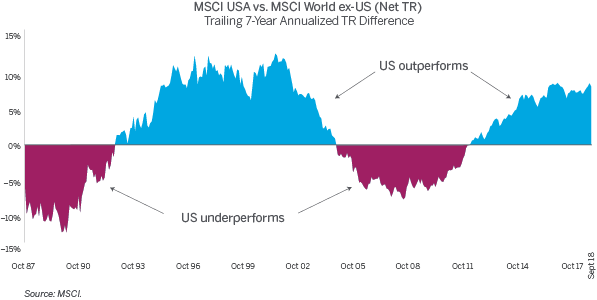Think locally, act globally
DAN BANASZAK, CFA 06-Nov-2019

It has been hard to argue with the results of a heavy allocation to U.S. equities over to the last several years. In 2018 alone, U.S. stocks have outperformed almost every other major stock market around the globe. Through late October, the MSCI World Index has been essentially flat year-to-date. However, when you remove just the U.S. from the index, the YTD return drops significantly to more than -7.5%.
Such home cooking has worked for domestic investors this year, and it’s actually part of an ongoing trend that has sustained for the past seven years. But trends don’t last forever, and regional equity returns have proven to be cyclical.

When put in a historical context, the recent outperformance of domestic equities relative to non-U.S. major markets is not unusual in magnitude or length. The accompanying chart shows trailing seven-year total return differences between the MSCI USA¹ and MSCI World ex-US² Indexes across time.
In the context of the last four decades, we have regularly seen runs of five to seven years (or more) when assessing the performance of U.S. versus foreign stocks. Given this recent stretch of outperformance by domestic stocks, and using history as our guide, the current environment may represent an intriguing opportunity for investors who have been under-allocated to global stocks. Is now the time to pivot strategically and potentially capture some of the benefits of global diversification?
The cyclicality illustrated in the chart is a reminder of the underlying benefits of global diversification. We all know that past performance does not guarantee future results, and while the chart above suggests that we might expect U.S. stocks to underperform their foreign counterparts going forward, it’s entirely possible for the existing trend to endure. Or, maybe domestic equities could begin underperforming tomorrow. The point is—nobody can predict the future.
But this is exactly why professional investors embrace the concept of diversification. In fact, being globally diversified doesn’t require you to make a bet on a specific country or region, nor does it suggest market timing. Rather, having sufficiently diversified global equity exposure helps ensure that you will participate in the best performing stock markets over time, regardless of whether that is driven locally or globally. However, please keep in mind that diversification neither assures a profit nor eliminates the risk of experiencing investment losses.
We believe that investors may be able to use this market volatility to pare down domestic allocations while strategically gaining more global exposure and the potential benefits of a broader diversification.




